BY MARI TAKETA
Behind every entrepreneur is a story. Here are a few stories of business owners featured in the Punahou Alumni Association Holiday Gift Guide.
Herman Pi‘ikea Clark ’78
CO-FOUNDER, PILI PACIFIC | PILIPACIFIC.COM
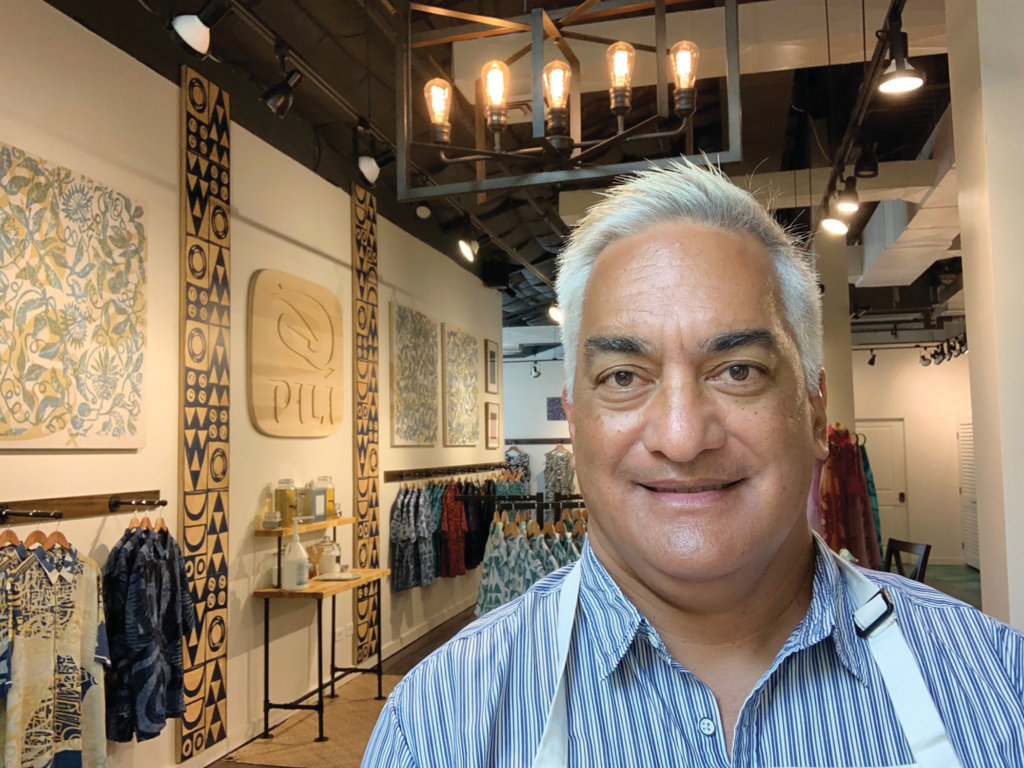
Call him the accidental entrepreneur. Herman Pi‘ikea Clark ’78 had everything but selling shirts on his mind when he stopped at Neiman Marcus to drop off materials for artwork the luxury retailer had commissioned for its new Ala Moana Center store. A noted artist and researcher, Clark had just accepted a lecturing appointment at a New Zealand university and was moving his family there. With his wife, Sue Pearson, he’d been exploring traditional printmaking across Pacific cultures, and on that day at Neiman Marcus, he was wearing the one shirt the couple had designed, hand-printed on cotton and sewn together. It caught the attention of a national buyer of menswear for the Dallas-based chain. “He looked at the shirt I was wearing and said, ‘where did you get that?’ I said we made it. He said, ‘can you make me a thousand?’ I said, ‘absolutely not,’” Clark recalls. “We barely knew how to make this one.”
Fast-forward 20 years, and Clark and Pearson’s Pili Pacific is now an established brand of limited-edition, hand-crafted shirts and dresses, whose prints the couple design themselves. Pili means to be joined and connected, as in through the ages and across the ocean. Print series like Mo’ikeha, Makawalu, Tahiti and Ora draw on the couple’s research into thousands of years of printmaking by Pacific cultures, each conveying layers of meaning. Take Hoaka, whose crescents and triangles march across garments in repeating patterns. Hoaka refers to the moon’s crescent-shaped phase, or to a flash or spark, like the print’s high-contrast black and white colors. Triangles represent teeth; when repeated, they symbolize lineage and generations. “Some of our customers who have that knowledge will understand the name and see the relevance in the design,” Clark says. “Others who don’t know may not see the reference, and that’s fine.”
You can find Clark at Pili Pacific’s shop at Ward Centre, working on prints and fabrics. He loves when customers drop in and talk story. “If we’re just selling nice garments, we’re no different,” he says. “This is something unique to Hawai‘i, unique to our family – that ability to find and recount the story, the repository of traditional knowledge.”
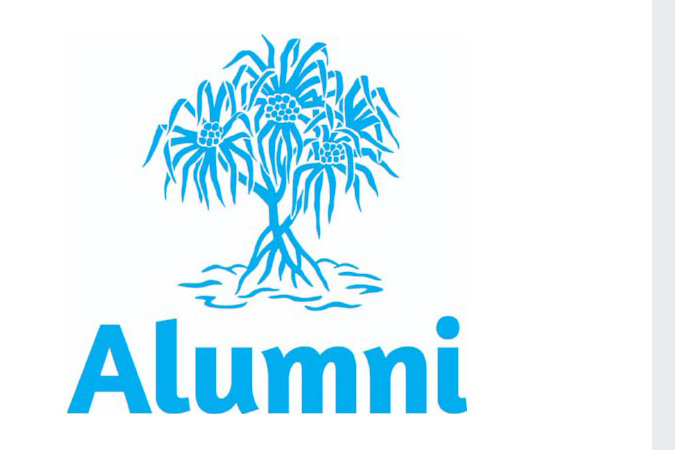
Punahou Alumni Association once again is showcasing entrepreneurs as part of its 2021 online holiday gift guide, making it a great time to snap up gifts while simultaneously supporting fellow Puns. Alumni retailers are offering exclusive discounts to our Punahou community.
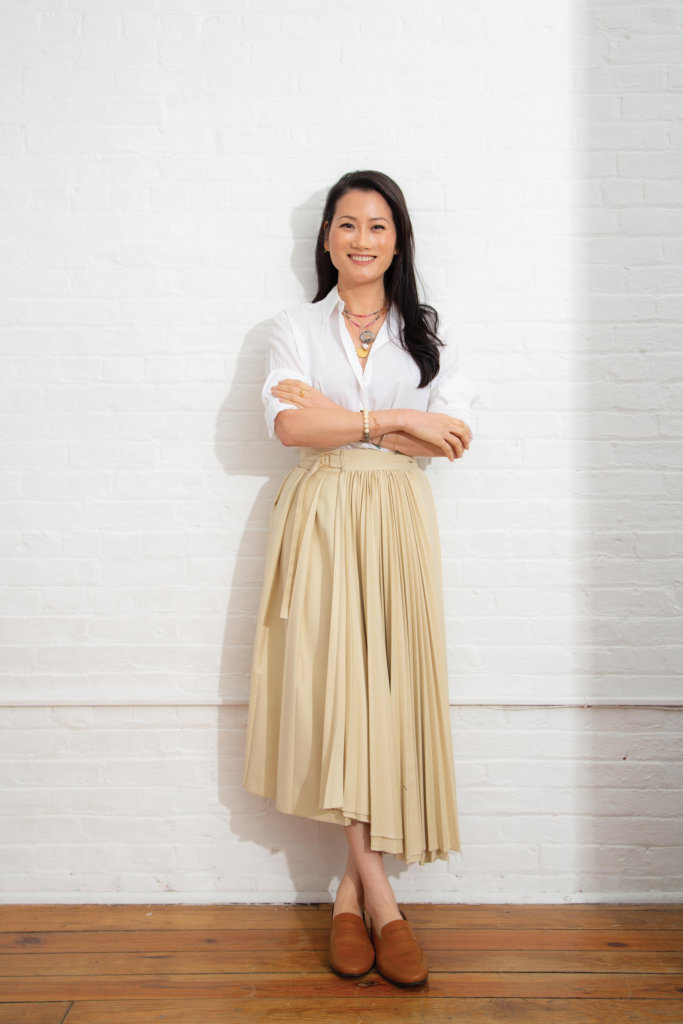
Nelli Kim ’95
FOUNDER, RĒDEN | SHOPREDEN.COM
Nelli Kim ’95 was a vice president at Bergdorf Goodman when two events changed the course of her life: a mission trip to India to help women and children of Mumbai’s red-light district and surviving stage 3 ovarian cancer. “I never thought I was going to be an entrepreneur, but there are times in your life when you get shown a set of circumstances and you realize you’re the one to solve the problem,” she says. “After 20 years in fashion, it was now or never. Already I’d beaten the odds with a diagnosis of a cancer with a 30% survival rate. Why not now?”
Kim left the luxury retailer and launched the New York City-based RĒDEN. With the tagline, “Radically comfortable shoes with a purpose,” the startup would address a real-world need in a way that she hoped would someday help rebuild the lives of the sex-trafficking victims she had met in Mumbai. Kim’s aha moment came during her months of healing after cancer, when painful neuropathy made wearing the $1,000 shoes she helped brand and sell excruciating. Other women faced the same problem, but no one was designing high-end footwear for comfort. RĒDEN’s shoes, designed with an orthopedic surgeon, would deliver elegant, fashion-forward aesthetics with cushioned, arch-supporting insoles and shock-absorbing outsoles.
After a successful Kickstarter campaign, Kim launched the startup in February. The shoes are being made in India, where Kim co-founded Embers International to help local nonprofits provide safe havens and education for those escaping the city’s sex-trafficking industry. RĒDEN’s first shoes are being delivered in November, with 50% of initial profits benefiting the American Cancer Society; afterward, Kim plans to donate to charities that help rescued women and children. “My goal is to grow big enough to be able to hire some of these women, because they have no jobs after being rescued. That’s why I have to grow big enough,” she says. “There are problems in this world. We can all contribute in a way.”
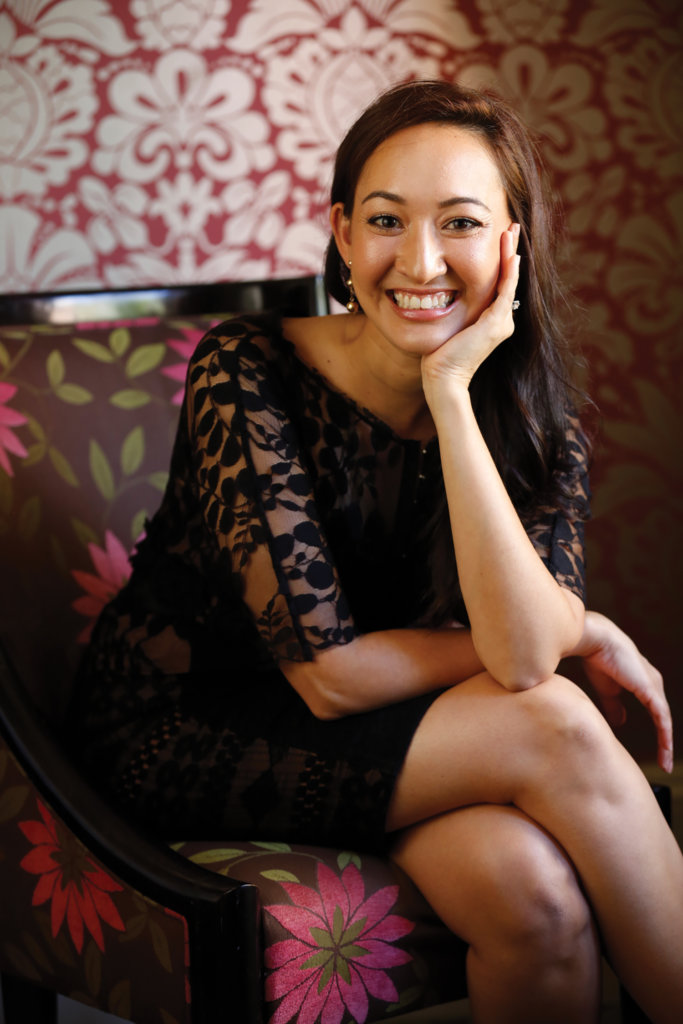
Ashley Houk ’01 Johnson
FOUNDER, MOHALA EYEWEAR | MOHALAEYEWEAR.COM
Ashley Houk ’01 Johnson always knew that Punahou
and her parents had given her the foundations for a successful first career – 14 years at Foodland, culminating in a district manager position in charge of 17 stores and 1,000 employees. But Johnson never fully realized the power of a strong education until she watched “Half the Sky.” The PBS documentary series chronicled women worldwide who had turned stories of oppression into opportunity. Case studies focused on sex-trafficked women, lack of educational opportunity for girls in Vietnam and other examples – all in stark contrast to the relative privileges of Johnson’s life. “Punahou is responsible for a lot of the success I’ve been able to have in life, and my parents. I would love to be able to impact other girls’ lives through education,” she says. “I wanted to become an entrepreneur to make a difference.”
Johnson founded Mohala Eyewear – a woman-owned, women-run company that makes sunglasses for women. From Foodland, whose CEO Jenai Sullivan ’77 Wall she credits as a mentor, she applied to Mana Up, founded by Meli James ’96 to give Hawai‘i entrepreneurs the connections and tools to scale up globally. Gradually she refined the focus of her company: Mohala would be inclusive, designing high-end sunglasses with a range of fits for the eclectic mix of women around her – those with low nose bridges and wide faces, high nose bridges and narrow faces, even those with lash extensions. For every pair of glasses sold, Mohala would donate a week of school classes and activities for girls in Bangladesh, Cambodia, India, Laos, Nepal, Sri Lanka, Tanzania and Vietnam.
By August, Johnson’s initiative had provided the equivalent of 70 years of school. Mohala will double the stakes on Giving Tuesday on Nov. 30, donating two weeks of school every time someone buys a pair of Mohala sunglasses at Nordstrom or on the company’s website.
Jon Everest ’92, Ben Komer ’98 and C.J. Smith ’03
CO-FOUNDERS, SIMPLE STRAP | SIMPLESTRAP.COM
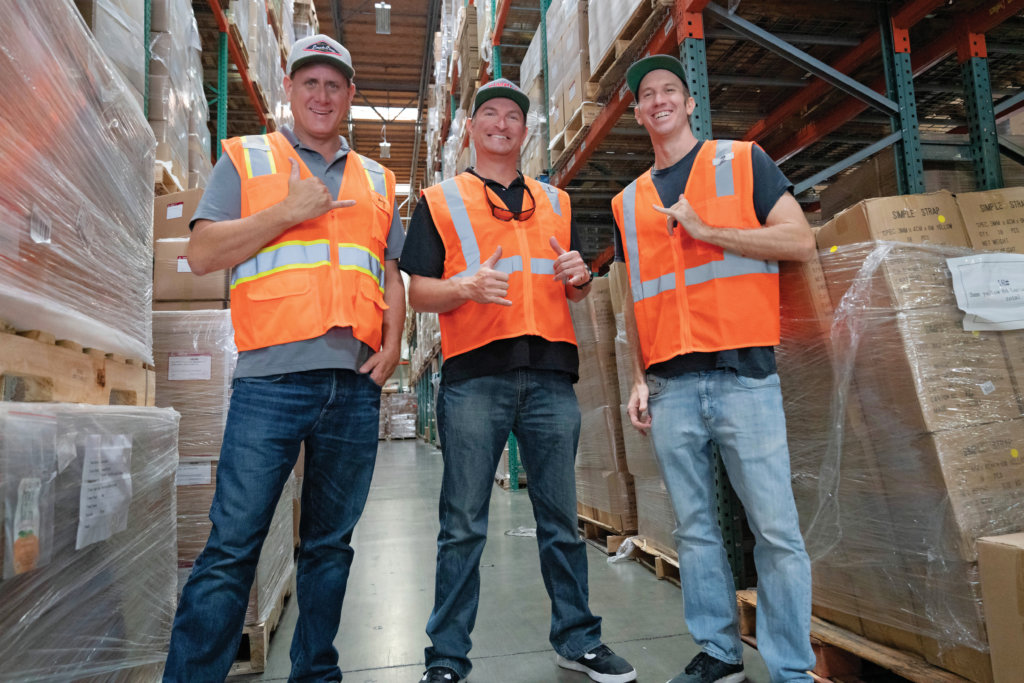
When Jon Everest ’92 paddles, he paddles hard, so the speed at which his venture came together is no surprise. Everest was looking for something to lash the ama crossbars to a canoe’s outrigger when the idea of manufacturing an all-rubber tie-down came to him. No one was making them. Hardware stores only sold rope, ratchet straps, duct tape and bungee cords. Rubber ties, he reasoned, would be faster than tying knots, easier than ratchet straps and more secure than bungee cords. He quickly realized that if rubber ties could hold an outrigger canoe together, they could do a lot more, including strapping down and bundling lumber and construction material. That’s when Everest, an attorney and former president of the Punahou O-Men, approached current O-Men President Ben Komer ’98 about making some samples.
Komer, who runs Lē‘ahi Swim School and had some experience manufacturing swim products in China, suggested bringing in C.J. Smith ’03, who had experience importing goods he developed, including his own brand of swim goggles (HI Supreme) – and Simple Strap was born.
In three years, Everest’s rubber tie-down idea has surged. Simple Strap, whose flexible, self-gripping rubber doesn’t scratch surfaces and grows more secure the more it’s wrapped around itself, hit the market in 2019, and is already on shelves at City Mill, Hardware Hawai‘i and Ace Hardware. Pandemic notwithstanding, the number of stores selling the rubber tie-downs grew from about 100 in Hawai‘i and California in 2020 to just over 1,100 now in North America, Australia and Europe. The trio received a U.S. patent this year and expect to add another 1,000 retailers by next summer, and then, Everest says, “pretty much every hardware store in the nation in the next three years.”
And that’s still only the beginning. Besides uses in commercial construction, craft and DIY projects, it’s a good tourniquet for first aid kits and storm prep. One user in Florida even sent a photo of an alligator whose jaws he’d secured with Simple Strap. As Everest notes, “it makes a perfect stocking stuffer.”
